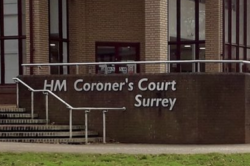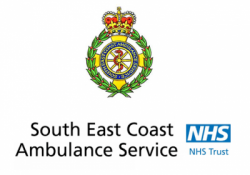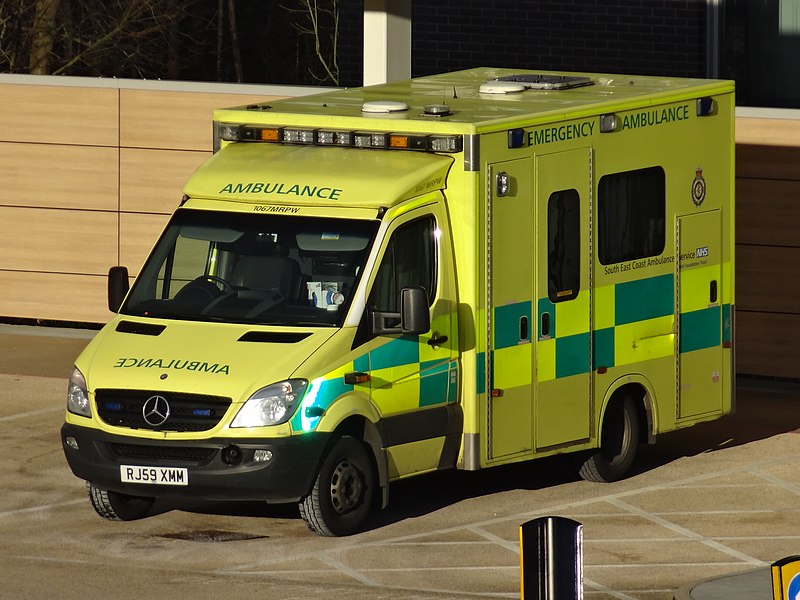 Abraham Lincoln
If given the truth, the people can be depended upon to meet any national crisis...
Abraham Lincoln
If given the truth, the people can be depended upon to meet any national crisis...
 Guildford news...
for Guildford people, brought to you by Guildford reporters - Guildford's own news service
Guildford news...
for Guildford people, brought to you by Guildford reporters - Guildford's own news service
Coroner Calls for Action over Ambulance Wait
Published on: 18 Sep, 2024
Updated on: 20 Sep, 2024
By Emily Dalton
local democracy reporter
The death of a man who waited more than three hours for an ambulance has prompted calls from a coroner for quicker clinical assessments.
Philip Ross died at the Royal Surrey County Hospital on December 19, 2023, after a fall in his home on December 3.
 Surrey’s assistant coroner Susan Ridge ruled that Mr Ross died of multiple organ failure after his accidental fall. Ms Ridge said she was concerned that South East Coast Ambulance Service NHS Foundation Trust (SECAmb) has not shown evidence that its timeline for clinical validation is being met, as in this case.
Surrey’s assistant coroner Susan Ridge ruled that Mr Ross died of multiple organ failure after his accidental fall. Ms Ridge said she was concerned that South East Coast Ambulance Service NHS Foundation Trust (SECAmb) has not shown evidence that its timeline for clinical validation is being met, as in this case.
Clinical validation is when a case is sent to a clinician to decide the best response for the patient at the right time.
Mr Ross’s wife called an ambulance at 11.25pm after her husband had a fall and was unable to move. Initially, Mr Ross’s case was labelled by SECAmb as Category 3, which would have a response time of 120 minutes, or two hours. Paramedics did not arrive until 2.30am, the Prevention of Future Death report stated.
During the wait, Mrs Ross made “a number of increasingly anxious calls to the ambulance service” about the urgency to help her deteriorating husband, according to the report.
Ms Ridge said Category 3 cases had a response time of 120 minutes and SECAmb aimed to validate these calls with a clinician within 90 minutes. But the NHS Trust’s target was not met in this case.
“No clinical validation of the calls took place until well over two hours from the initial call,” Ms Ridge said. The court heard the delays came from a “surge” in the number of calls as well as a lack of available clinical staff or “clinical hours”.
Categories 3 and 4 are judged as less serious cases and so have longer required response times from ambulances. However, this can become extended even longer at times of high demand.
The report stated: “Because of these potentially long response times, timely clinical validation is important to ensure correct categorisation and/or identify a deteriorating situation.”
The coroner said she is concerned that late or delayed assessment and sorting of these initially “less serious” cases is “placing patients at risk of early death”.
The ambulance service has 56 days from 16 September to respond to the coroner’s report.
 A SECAmb spokesperson said: “Our thoughts and condolences are with Mr Ross’s family. We are very sorry that we were not able to respond to him more quickly.
A SECAmb spokesperson said: “Our thoughts and condolences are with Mr Ross’s family. We are very sorry that we were not able to respond to him more quickly.
“We recognise that there are times when we are taking longer than we should to respond to some calls and are working hard to address this and improve performance across all categories of call. Having recently been written to by the coroner, we will respond in full to her within the requested timeframes.”
Report: https://www.judiciary.uk/prevention-of-future-death-reports/philip-ross-prevention-of-future-deaths-report/
Recent Articles
- Angry CIL ‘Debtors’ Thanked for Their Patience by Waverley Council
- Letter: If the Shalford Councillor Want Wind Turbines Put Them in Shalford
- Birdwatcher’s Diary No.327
- This Year’s Guildford Fireworks Night By the Lions Could Be the Last
- M25 Junction 10 Closure
- Controversial Flats Approved for Godalming High Street
- Feature: ‘Why Do Trans Rights Matter? That’s An Excellent Question’
- Guildford Green Day Returns
- Letter: I Am Delighted that a Start Has Been Made on North Street
- Get Your Entries In for a Design Award


Search in Site
Media Gallery
Dragon Interview: Local Artist Leaves Her Mark At One of England’s Most Historic Buildings
January 21, 2023 / No Comment / Read MoreDragon Interview: Lib Dem Planning Chair: ‘Current Policy Doesn’t Work for Local People’
January 19, 2023 / No Comment / Read MoreA3 Tunnel in Guildford ‘Necessary’ for New Homes, Says Guildford’s MP
January 10, 2023 / No Comment / Read More‘Madness’ for London Road Scheme to Go Ahead Against ‘Huge Opposition’, Says SCC Leader
January 6, 2023 / No Comment / Read MoreCouncillor’s Son Starts Campaign for More Consultation on North Street Plan
December 30, 2022 / No Comment / Read MoreCounty Council Climbs Down Over London Road Works – Further ‘Engagement’ Period Announced
December 14, 2022 / No Comment / Read MoreDragon Interview: GBC Reaction to the Government’s Expected Decision to Relax Housing Targets
December 7, 2022 / No Comment / Read MoreHow Can Our Town Centre Businesses Recover? Watch the Shop Front Debate
May 18, 2020 / No Comment / Read More












Recent Comments